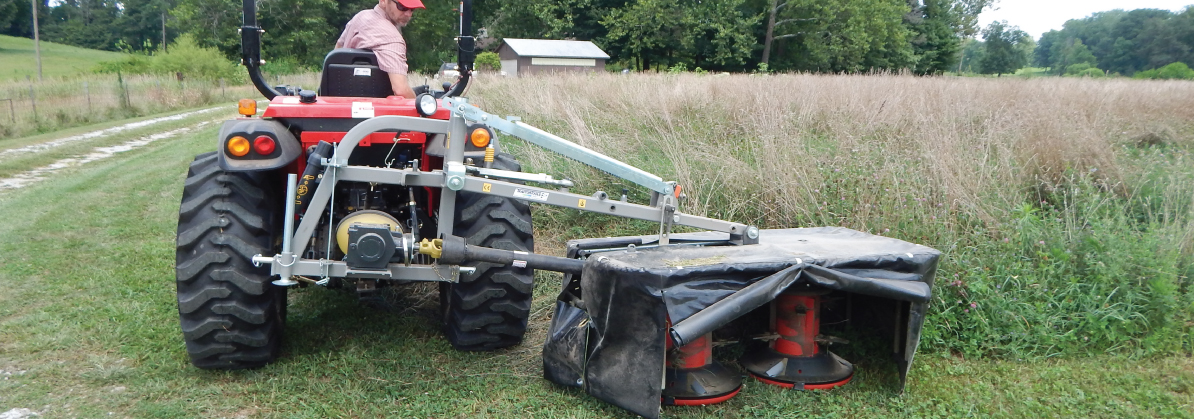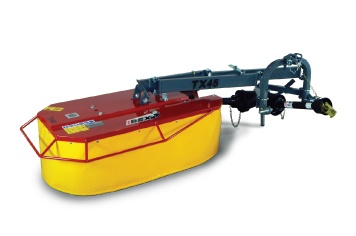When is a drum mower the right choice for your operation?

Trying to decide which type of mower to purchase can seem like a daunting task. At Tractor Tools Direct we believe in not only providing high quality implements to our customers but also in providing top quality information to help you in your purchase. Since mowers come in all shapes and sizes, many of our customers need help in determining which type will best meet their needs. In this post we’ll help you to determine if a drum mower could be just that!
What is a drum mower’s uses, and how does it work?

Typically, a drum mower is used for hay cutting, not finish or brush mowing. The standard drum mower has two counter-rotating drums that are powered from a gearbox above. Each drum is essentially a cylinder of 10-14 inches in diameter and length of 15-24 inches, with a large disc attached to the bottom. Depending on the model, either 3 or 4 free-swinging blades are attached to each of these discs. When in operation, the entire drum/disc/blade assembly rotates. This heavy rotating mass creates a great deal of momentum, which helps to power the mower through thick spots in the field. On the bottom of this assembly is a dish which is mounted on ball bearings. This dish does not rotate with the rest of the drum assembly, but rather slides along the ground and can rotate freely in either direction depending on the surface it slides over.
As a drum mower moves through the field, the drums are rotating toward each other, which causes the cut crop to pass between the drums and be dropped in a windrow behind the mower. This windrowing effect eventually must be spread back out with a tedder or rake in order for the hay to dry properly. This has been the major drawback of drum mowers up to this point. However, the design of our Terra mowers has solved this problem with an exclusive conditioning system. This system ejects the cut hay out the rear of the mower in a spread-out and fluffed manner, allowing the hay to dry where it sits. This potentially saves an additional trip through the field with a rake or tedder and can shorten drying time by up to a day. Amazingly, Terra’s design accomplishes this feat with absolutely no additional moving parts.
Drum mower advantages are:
- No hydraulic requirement. You do not have to have hydraulics on your tractor. For transport, the drums swing to the rear of the tractor manually.
- Durability. Drum mowers are easily the most rugged of the hay mower types. They rarely sustain damage even from striking an unmovable object. This makes them a great choice for contract cutting in unfamiliar fields or for mowing unruly pastures.
- High ground speeds. A drum mower can be run at even higher speeds than a disc mower, and double the speed of a sickle bar.
- Low power consumption. This feature is important particularly with older utility tractors of modest horsepower.
Drum mower disadvantages are:
- Contour mowing. Because the drums are very heavy, it is not recommended to hang the mower out over a downward slope. Drum mowers also do not pivot enough to effectively follow extreme contours like a sickle bar will.
- Weight. The drum mower’s heavy weight can be detrimental for tractors with light front ends. Drum mowers are very heavy in relation to other mower types of the same width. This can make maneuverability and transport difficult if there is not sufficient weight holding the front wheels of the tractor down.
- Windrowing. Since most drum mowers windrow the cut crop, it will not dry in the field without being spread out or double-raked. However, Terra drum mowers are the exception to this rule. Their conditioning system fluffs and spreads the cut crop for faster drying time.
Hopefully this answers some questions you may have had (and possibly didn’t even know you had) about when to choose a drum mower for your operation. More can be learned here on our drum mower product page or here on our buyer’s guide.
Recent Posts
-
The Subcompact Economy Hay Package: Your Gateway to Small-Farm Hay Production
For small-acreage farmers who want to step into hay production with confidence, affordability, a …Feb 6th 2026 -
Power Harrows for Spring Soil Prep: The Must-Have Tool for Small Farms
Spring is coming fast — and for growers, livestock managers, and land stewards, that means it’s …Feb 1st 2026 -
The Evolution of the Kubota BX Series: How a Sub-Compact Became a Powerhouse
While we here at Tractor Tools Direct do not sell Kubota BX tractors themselves, we do sell plen …Jan 15th 2026




